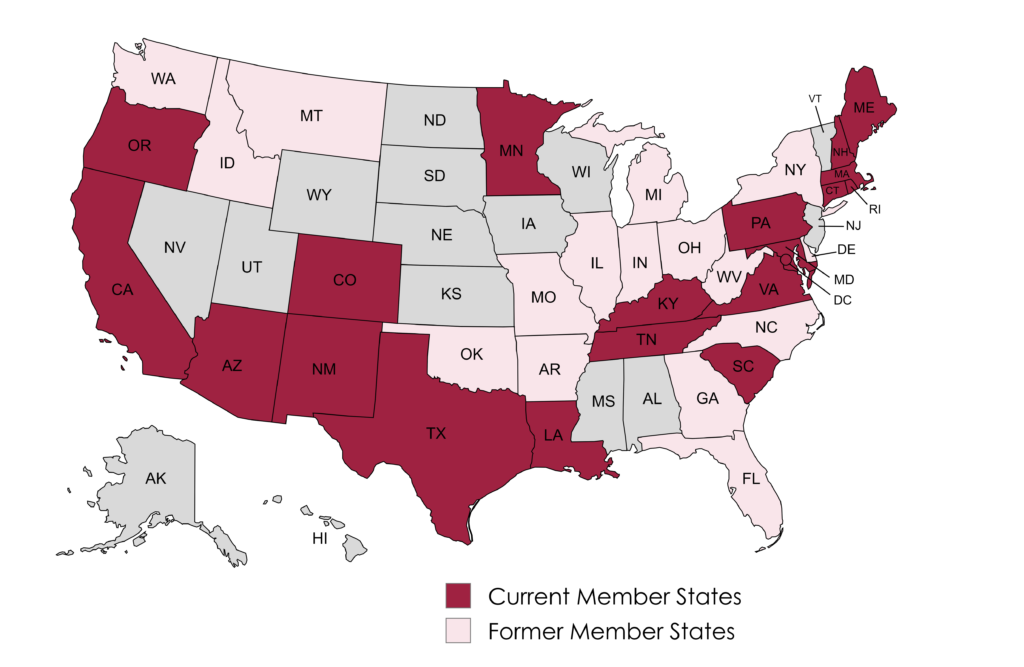SPOTLIGHT ON MEMBER STATES
“With your help and guidance, we are helping programs learn how to incorporate more technology of all types into programming and reach more students. I heard many “ah-hahs!” as folks left the mini-institute.”
– Heidi Silver-Pacuilla, Ph.D. Office of Career, Technical, and Adult Education, Virginia Department of Education
“IDEAL 101 provides an exceptional opportunity for colleagues within a program to partner with others from around their state for in-depth study on the fundamentals of distance and blended learning programs, including research and best practices, supported by knowledgeable facilitators and engaging discussions.”
– Adam, Minnesota
2024 – 2025 Member States

- Arizona: Looking at data to support quality instruction in various delivery models.
- California: In the past year, OTAN has continued to lead the way in supporting California’s adult educators through initiatives like the two-year Digital Leadership Academy. This effort along with many others – our Digital Learning Guidance, statewide Canvas implementation, the continued development of various OTAN resources – has empowered educators to integrate technology effectively into their classrooms, leading to more engaging and accessible learning experiences for adult learners across the state.
- Colorado: Continuing to draw on IDEAL PD resources to scale up distance education in the state and expand provision to include more synchronous options.
- Connecticut: The Digital Adult Training and Development Network (ATDN) excels in providing comprehensive digital literacy support through resources and professional development, while prioritizing professional growth, and digital equity.
- District of Columbia: OSSE Adult and Family Education partners with the University of the District of Columbia Adult Education Program, IDEAL Consortium and Mustard Seed Training to launch two-year (2023-2025) Action Research Distance Learning (ARDL) Project for DC IE&T Providers, inclusive of Action Research, HyFlex Planning and Piloting and Industry-Focused Standards and Communities of Practice.
- Kentucky: Kentucky: Statewide online learner cohorts for math and reading
- Louisiana: Cultivating a sense of belonging and communities of practice through professional development
- Maine: Increasing opportunities for Maine’s adult learners through access to high-quality blended, remote, or in-person instruction.
- Maryland: Maryland continues to develop and produce its well-received Virtual Training Institute while laying the groundwork for a robust Learning Management System to streamline instructor and program professional development.
- Massachusetts: Promoting digital resilience and digital literacy for all staff and students in Public Adult Education of Massachusetts.
- Minnesota: Evaluating digital learning professional development, training and resource needs of MN adult education programs and practitioners
- New Hampshire: Increasing access to adult education through flexible scheduling and multiple service delivery modes designed to meet the needs of adult learners
- New Mexico: New Mexico: Engaging more educators through microlearning videos.
- Oregon: Strengthening distance learning and digital literacy in adult education throughout the state
- Pennsylvania: Supporting teachers and programs in Pennsylvania to routinize the use of distance education and digital literacy support as part of their mainstream service to learners.
- Rhode Island: Rebuilding the state’s technology PD system to encourage a growth mindset and support RI practitioners in incorporating digital literacy instruction into all classroom routines!
- South Carolina: Leveraging technology to support and empower adult learners.
- Tennessee: Returning digital literacy choices back to the programs and reimaging policies and support.
- Texas: Texas is bridging the digital divide with unified standards, free resources, and innovative support, ensuring digital literacy for all.
- Virginia: Supporting programs with a focus on quality teaching online across the program types and educational levels.
